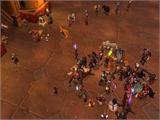The Implications of Online Games for Network Communities
Let's take a look at some interesting comparative data.
1. The highest daily number of users simultaneously online on MSN is 500,000. The highest daily number of users simultaneously online in World of Warcraft is 5 million.
2. A well-performing business on general portal sites generates about 20 clicks per user per day; online games generate more than 20 clicks per user per minute, and the average member spends over an hour online playing games every day. If one click in the game counts as one page view (PV), then the PV of the game would be 3600 times that of the website.
3. The annual trading volume of virtual game equipment in China is not less than twice that of game point cards, approximately 4 billion yuan.
The results and user stickiness achieved by online games are enviable, but this is not to suggest that network communities must follow the model of online games. In fact, online games are also a type of network community, just with a more special community group. However, their success follows certain inherent rules, which have strong reference value for other types of network communities, especially those focused on text and image browsing. Below, we will find these rules through comparison.
### I. Why should users actively contribute clicks?
Network Community: 70% comes from content title attraction, 20% from user personal profiles. The main click behaviors include browsing, posting, commenting, voting, collecting, editing, etc. Platforms like MYSPACE, which are centered around individuals, see an increase in click volume for personal profile editing, but the proportion does not exceed 30%.
Online Game: 70% comes from game rules and game plots themselves, 20% from member interaction, and 10% from personal settings.
Although the forms of attracting user clicks differ greatly between communities and games, the internal driving force that motivates users to continue clicking can be the same. Some people say that game graphics are beautiful, and network communities cannot achieve the same level of realism as games, which is true. However, early online games were purely text-based (MUD games), and even then, their PV/UV was much higher than that of network communities. The core driving factor is actually the first principle of community platform -
**Rapid Value Feedback Principle**
In games, the value feedback of each click is basically immediate. When I swing my sword, blood appears, and whether or not I've defeated the enemy is directly reflected on the screen. If I need to strike five more times to defeat half the enemy's health, then I click the mouse five more times. In network communities, the value feedback of clicks, except for browsing behavior, is delayed. Single browsing behavior cannot form rapid value feedback for clicks. Whether an article has touched me requires time to read it fully before making a judgment, and after making a judgment, it is not certain whether I should provide this judgment as feedback to the website platform, and in fact, only a few people do so. Website community platforms cannot offer clear value incentives for user-generated content contributions (posting, replying, voting, etc.) like games can. The reason games win here is because they provide sensory stimulation that users must obtain through clicks to get system instant responses, during which users gain pleasure.
What kind of lessons can network community platforms learn from this? That is, any active behavior you expect from users needs a mechanism for rapid value feedback. This mechanism is embodied in the design of the interactive mechanism between the website and its users. Specific manifestations include: a quick feedback mechanism for click behavior, reply notification function, and quick reminder functions for articles being recommended or replies being cited. For posters, their own contribution to PVs is often higher than other browsers, because they frequently check for new replies to their posts. Therefore, shortening this feedback cycle will significantly increase the number of clicks contributed by individual users each day.
### II. Why should users continuously contribute clicks?
Network Community: The core contributors to community clicks are what we call "opinion leaders." They enjoy sharing and are eager for feedback from others. This emotional accumulation often becomes the core driver of adhesion for various network communities. The second point comes from the accumulation of group atmosphere. When an opinion leader gathers a group of common communication partners on a community platform, he develops a dependence on this group.
Online Games: It also comes from three aspects. First, the game's development path itself requires him to continuously contribute clicks. Second, the suspense of creative results formed by netizen interactions constantly gives him fresh stimulation. Third, all clicks contribute to the gaming goals pursued by netizens. Killing 100 monsters to level up, each level-up brings more abilities and equipment to enhance competitiveness in the game world.
To make users continuously contribute clicks, games fully demonstrate a principle—
**Progression Principle**
The so-called progression principle refers to phased milestones, which is leveling up. Each level-up provides more value feedback and has an accumulative effect.
When applied to the construction of network communities, it means a ranking system and the corresponding relationship between rank and functional permissions. Some communities have ranks, but apart from different descriptions in rank titles, there are no differences in functional permissions or honors, leading to a decline in users' motivation to continuously click. This rule is also the same in games; poorly designed games with unclear rank advancement effects will reduce users' demand for leveling up.
### III. What can you give me? Do I need what you give? What do I need to do to get it? Is my input balanced with what I receive?
For any internet user, these are questions everyone has thought about. Game manufacturers have deeply understood them, but community operators often haven't considered them thoroughly enough.
Network Community: Providing excellent original content, providing opportunities for socializing, providing a platform to showcase your personal charm. You need to actively participate in posting and replying, need to actively participate in forum activities, and after accumulating a certain amount, you can become a moderator. As a moderator, you can get some permissions that other users don't have, a process that usually takes several months. During this process, you can continuously gain recognition from others, accumulate your network, and gain satisfaction from self-display. Balancing input and output is up to you.
Online Games: Fresh and stimulating visual and auditory stimuli, self-realization satisfaction through virtual stories, experiencing the feeling of being strong in the virtual world, gaining support from others, and the sense of accomplishment from completing tasks through teamwork.
We can see differences here, and this core difference leads to the third principle—
**Clear Development Path Principle**
For a gamer, once he chooses a type of game, he can quickly understand the development path within that game and continuously gain a sense of achievement while doing so. For network communities, general users are unclear about their development paths in the community. Most communities design vague routes and stage-based value returns for these users, making network communities a casual pastime activity without much purpose. Without purpose, the triggering of actions is greatly reduced.
How can network communities improve in this aspect? There are a few points: First, value drivers need to be prominent. For network platforms, this value includes the inherent media effect of the website — exposure rate or opportunity for fame — and also includes various interest-driven factors. Early QQ coins and Baidu coins laid the foundation for providing more interest-driven factors. Second, leverage website resource advantages to play an integrative role. For example, Sina Blog, due to its early strategy of promoting celebrities, led to many blog sites criticizing it for violating the grassroots principles of Web 2.0. But in reality, both celebrities and grassroots users recognize Sina Blog, with continuous increases in traffic and activity. The reason lies in its provision of a development path from grassroots to celebrity, where the value manifestation of each link in the chain fully leverages Sina's media characteristics. For instance, ACOSTA, originally a grassroots blogger, became famous through it and quickly signed with a well-known fashion magazine to become a spokesperson due to Sina's media influence.
### IV. How does netizen interaction occur?
Network Community: Many people now mention concepts like MYSPACE and SNS regarding netizen interaction. However, many domestic websites that mimic MYSPACE have not succeeded. Network communities still need to explore the intrinsic driving forces behind netizen interaction. Interaction between netizens and the platform has already been discussed, and good communities generally realize interaction among netizens through the following points: shared interests, group-created value, private exchanges in small groups, voyeuristic and herd psychology, and individual social resource management needs.
Online Games: Different from network communities, for online games, cooperation is made a necessity rather than an added value in game rule design, such as CS teams and World of Warcraft guilds. Meanwhile, the value generated by group interactions is direct and highly attractive.
From this, we can summarize a principle of netizen interaction—
**1+1>10 Principle**
That is, the value generated by interaction between netizens is far greater than the value generated by interaction between netizens and the platform. This is something the platform should actively demonstrate and present. Examples include the activity of QQ groups and the value manifested by Taobao Alliance members.
Possible improvement measures include: full display of group value, regular offline theme activities, small-group interaction functions on the website (one-to-one functions and small-group communication functions).
### V. Equality for All or Social Fairness
Class is a characteristic of society. Although network communities advocate equality for all, to truly form a cohesive community structure, they must shift from flat management to mature class management.
Network Community: For network communities, the simplest class relationship is administrator — moderator — netizen. However, this class relationship is still too simple. There is still a significant gap between it and the class division in real society.
Online Games: Due to their high degree of realism and player investment, current online games have already formed very complete and complex class relationships. Each class not only has very specific divisions of labor and resources, but also a comprehensive set of interest relations that ensure each role maximizes its own interests while contributing to the team's interests. And this is the fifth principle of network communities—
**Classified Principle**
This principle is often a blind spot for many communities. Under the impact of the Web 2.0 trend, more people believe that the internet can form a utopia of equality for all, which actually goes against natural social laws. Wherever there are people, there is a江湖 (a metaphor for a complex social environment). The right to speak can be redistributed, but the audience resource will always ultimately be a majority participating in competition, with only a few eventually succeeding.
The inspiration that online games bring to network communities is just a starting point, because I have already said that online games are also a form of network community. Their inherent rules are consistent. Good games and good communities both follow the basic rules of social relations, while bad games and communities generally violate these rules in some way.




